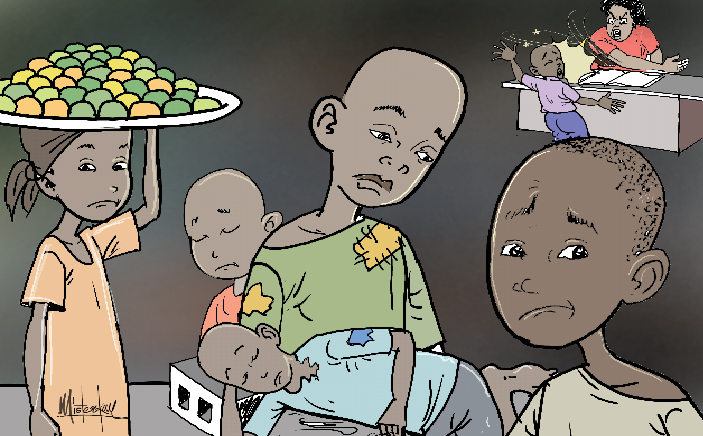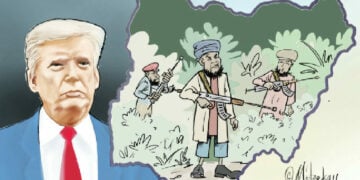It was about 1 am when the ringing tone of my phone hummed defiantly. The ringing started to get on my nerves, compelling me to wake up from the much-needed sleep I needed badly that night. The call was from a friend I hadn’t spoken to in a week.
Half asleep and drowsy, I answered, only for him to ask if I was already asleep as if he was expecting me to be doing something other than sleeping at such an unholy hour of the night. I told him that it was his call that cruelly woke me up. He laughed and said, “Check your WhatsApp. I sent you a video.”
Out of sheer curiosity, I reluctantly opened the message, and what I saw left me shaking. The 2-minute clip portrayed a level of cruelty against children that was hard to explain. It was the most harrowing act of violence against children I had ever witnessed. Sleep eluded me, and my eyes became very clear, obviously because of the enormity of the thoughtless act. Personally, I find any cruelty to children utterly repellent, and the one portrayed by the video was nothing short of barbarism.
Nigeria has no shortage of laws protecting children. From the 1999 Constitution to the Child Rights Act (2003), the Violence Against Persons Prohibition (VAPP) Act, and the Free Universal Basic Education Act (2004), these legal frameworks mandate protection, education, and equal opportunities for all children.
For instance, the Child Rights Act criminalizes child hawking, begging, and being out of school during school hours. Yet, over 18 million Nigerian children roam the streets daily, exposed to exploitation and danger. Why does this stark contradiction exist?
The answer lies in implementation. These laws are, more often than not, merely words on paper. How else can one explain why over 18 million Nigerian children remain out of school despite their legal right to free, compulsory education?
The question then arises as to how, in spite of these fine legal provisions, the life of the Nigerian child, save for the few privileged ones, has been brutish. To put it succinctly, as Richard Carl Ntiru queried in his poem, “The Pauper,” ‘What brutal force, malignant element’, would dare to forge this piteous fate for the Nigerian child? How come the Nigerian child is often ill-treated by parents, guardians or even some strangers on the street?
The snag is in implementing these laws. It is clear that these laws exist more in papers and are consistently being observed in the breach. If not, how does one explain the fact that the nation has over 18 million children out of school even when the Free Universal Basic Education Act of 2004 provides explicitly that all children have a right to free, compulsory basic education?
Because the will to implement these laws is lacking, and since laws are worthless without implementation, it seems as if the lives of a significant number of the nation’s children, ages 0-14, which constitute over 42% of the population, do not matter.
The harsh reality hit home recently when a video of a 45-year-old teacher slapping a 3-year-old pupil went viral. Thankfully, the teacher is now facing prosecution, but such incidents underline the grim truth: Nigerian children face daily abuse—sexual, physical, and emotional—despite existing safeguards.
Tales From Kano
Even as Nigerians continue to lament the interception by the Police in Abuja of 59 children packed like sardines in a Peugeot J5 bus from Kano to Nasarawa state, we are reminded of a heart-wrenching episode in Kano where the Hisbah Corps rescued 230 children during a pre-dawn operation.
These kids, abandoned on the streets, were found in markets, motor parks, under bridges, and even at viewing centres where they paid to watch TV and sleep. Tragically, four children were found dead, succumbing to illnesses and exposure to harsh weather.
Sheikh Aminu Daurawa, Hisbah’s Director General, disclosed that 15 of these children suffer from life-threatening ailments. It is estimated that over 5,000 children in Kano alone are in similar conditions, sleeping in markets, under bridges and motor parks.
The Hisbah has temporarily sheltered the 230 rescued children with the support of the Kano State government. Some of them are receiving medical treatment. But the question on the lips of many is: Where are their parents? Who bears the responsibility for their care?
A Collective Failure
It is painfully clear that these rescued children, like their counterparts who roam the streets of Kano and other major cities in the north, are from the nineteen northern states and neighbouring Niger Republic, Cameroon and Chad. They are victims of parental and societal neglect. Left to fend for themselves, they often become easy targets for recruitment by terrorists and criminals.
Boko Haram members, Lakurawa and the bandits who have been exacerbating the insecurity in the north get easy recruits from the pool of these abandoned children.
The Defence Headquarters recently revealed that over half of the 120,000 repentant Boko Haram members are children. And we are still wondering why insecurity has remained intractable. This grim statistic underscores the far-reaching consequences of neglect.
Breaking the Cycle
Religion is often cited to justify large families, but both Islam and Christianity emphasize the responsibility of parents to provide for their children. Food, shelter, education, and healthcare are non-negotiable duties. Yet, many have abandoned these responsibilities, leading to the heartbreaking scenes we witness daily.
The North, which has the highest number of street children, must engage in honest dialogue about family planning and birth control. Poverty is frequently blamed for neglect, but irresponsible parenting also plays a significant role.
Empowering families to become self-reliant and encouraging responsible parenting are crucial steps. This way, children can grow up in nurturing environments with access to education and opportunities for a brighter future.
The video my friend sent haunts me still. It depicts abandoned, malnourished, and exposed children. Such images are a stark reminder that we, as a society, can and must do better. The Northern Governors’ Forum and other stakeholders must rise to the occasion and prioritize the welfare of our children. Their future depends on our actions today.





